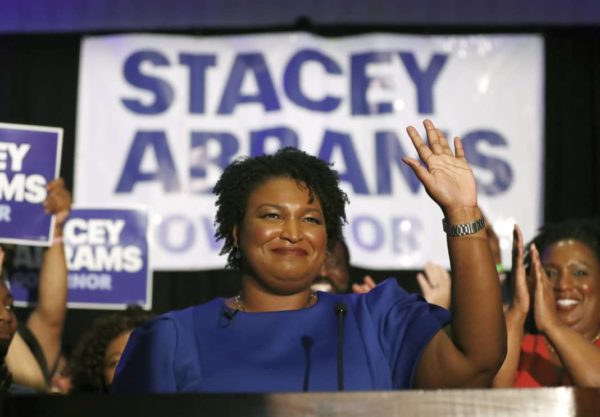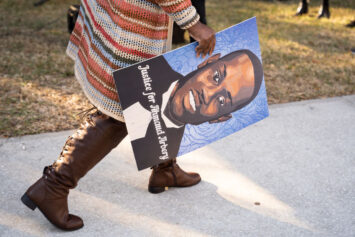
FILE- In this May 22, 2018, file photo Democratic candidate for Georgia Gov. Stacey Abrams waves at a campaign event in Atlanta. Over the course of a year, Stacey Abrams has transformed from a technocratic leader in the Georgia legislature into a nationally known symbol of the Democratic Party’s future. (AP Photo/John Bazemore, File)
COLUMBUS, Ga. (AP) — If Stacey Abrams becomes America’s first black female governor on Tuesday, former President Jimmy Carter and Oprah Winfrey could be the keys to her success.
Her ability to win over a 94-year-old white man with deep ties to the rural South and one of the world’s most famous black women who rarely dabbles in campaign-style politics highlights Abrams’ strategy to win the Georgia governor’s mansion. She’s betting that charm, unabashed liberalism and her roots can motivate a coalition of black voters, liberal whites in the city and enough white voters elsewhere to overcome persistent Deep South divisions over race, culture and politics.
It’s a tall order for a state that hasn’t elected a Democrat as governor since 1998.
The balancing act will be on display in the coming days. Winfrey will campaign Thursday with Abrams, appearing in both a Democratic stronghold and a Republican-leaning suburb, an itinerary befitting someone who built her empire with a cross-section of fans. Former President Barack Obama will campaign for Abrams Friday at historically black Morehouse College.
For her part, Abrams is pitching her agenda, particularly Medicaid expansion and public education, to the full electorate, including rural white voters often overlooked by Democrats in previous campaigns.
Those close to Abrams say she and her campaign are keenly aware of the challenge.
“The South really is changing,” Abrams’ mother, the Rev. Carolyn Abrams, said in an interview. “Black candidates, especially black women, are being taken seriously.”
But the elder Abrams struck a cautious note. For her daughter to win, “It’s going to take the people who populate all the state of Georgia, not just whites, not just blacks, not just Latinos, but right-thinking people coming together.”
Polls show a tight campaign between Abrams, a former state legislative leader, and her Republican opponent, Brian Kemp, the current secretary of state. Republicans control state politics, but their winning margins in recent elections hasn’t been nearly as wide as in other Deep South states. President Donald Trump won Georgia by 5 percentage points; outgoing Gov. Nathan Deal topped out at 53 percent of the vote.
If no one emerges with more than 50 percent of the vote next week, a runoff will be held in December.
The campaign has been overshadowed by race in its final weeks. Abrams has blasted Kemp’s performance as the state’s chief elections officer, joining voting rights advocates in accusing him of using his post to make it harder for citizens, particularly minorities, to vote. Kemp maintains he’s merely following federal and state election laws.
Abrams, meanwhile, found herself on defense after a photo resurfaced of her participating in a 1992 protest in which the Georgia flag was burned. At the time, the flag contained the Confederate symbol. During a debate with Kemp, Abrams said she “took an action of peaceful protest” and noted that Kemp himself voted as a legislator to strip the state flag of its Old South insignia.
Still, the dynamics in Georgia contrast to neighboring Florida, where Democrat Andrew Gillum could become the state’s first black governor. Trump recently tweeted without evidence that Gillum was a “thief.” And at a recent debate, Gillum noted his GOP opponent, former Rep. Ron DeSantis, was backed by an activist who once used a racial epithet in describing Obama.
“I’m not calling Mr. DeSantis a racist,” Gillum said. “I’m simply saying the racists believe he’s a racist.”
Abrams has been more circumspect when discussing race and the historic nature of her potential victory.
“I look forward to making history,” she’ll say in some national media interviews.
She extols her parents, both ordained Methodist clergy, and details her father’s challenges as a “black man in Mississippi” once dismissed as “just another problem” because of his dyslexia. She tells of being invited to the Georgia governor’s mansion as her high school’s valedictorian, only to have a security guard initially deny her and her parents entry after they stepped off a transit bus at the gates of the estate. “He never asked for the invitation my mother had in her purse,” Abrams says.
In recent weeks, Abrams began incorporating into her campaign speech a scene she witnessed in tiny Seminole County in southwest Georgia’s wiregrass territory. She recalled watching two elementary school boys help each other use a water fountain neither of them was tall enough to reach alone. Deep into her telling, she mentioned that one boy was white and the other was African-American. Then she hit her crescendo.
“They didn’t have to argue about who got to be first in line. … They didn’t argue about whether there’d be enough,” Abrams said. “They knew instinctively that if they worked together, they would both be made full, they’d both be made whole.”
Her paid advertising features the gamut of Georgia’s 10 million-plus residents, but perhaps most notably includes a white worker who tells voters in a distinct south Georgia accent that Abrams “fights everyday” for “guys like me.”
Abrams knows she won’t get every vote — or many votes at all — among older whites who long ago abandoned the Democratic Party, people like Dr. Robert Williams and Ken Kline, two veterans in the north Georgia town of Rome who describe themselves as “big Trump fans.”
Williams, an 83-year-old retired Air Force surgeon, listens to Abrams’ proposals and hears a would-be governor who “just wants to make everything free.”
Kline, a Navy Seabee during the Vietnam War, expresses alarm over Abrams’ support for taking down Confederate monuments from state property — a position that Abrams does not make part of her central pitch.
“We don’t get to have a heritage,” the 71-year-old Kline says.
Even with their criticisms, Williams and Kline implicitly grasp the strategy.
“Some of the young people seem to be for her,” Williams said.
Joel Huff may be one of them. A 43-year-old white man who lives in Athens and travels the state working on solar energy projects, Huff said he doesn’t vote in some elections.
But after happening upon an Abrams’ campaign stop alongside Carter, the former president, Huff asked Abrams about her energy ideas and said he “absolutely loved” her answer about investing more in solar both for economic and environmental benefits.
Black politicians have succeeded in previous statewide Georgia elections, though never as governor. Thurbert Baker won three terms as attorney general after first being appointed to the post. Michael Thurmond was elected to three terms as state labor commissioner after first winning a legislative seat in a majority white district. Rep. Sanford Bishop currently represents a majority white congressional district anchored in Columbus.
Bishop and Thurmond, now the executive of DeKalb County in metro Atlanta, say Abrams is already meeting the first task: asking for votes everywhere.
Economic arguments, Bishop said, transcend race, because “everyone wants a better life.” Thurmond, who lost his initial bids for elected office, adds that as a black politician “you should not let your own fears about who might or might not vote for you get in the way … because you never know what is in someone’s heart.”


